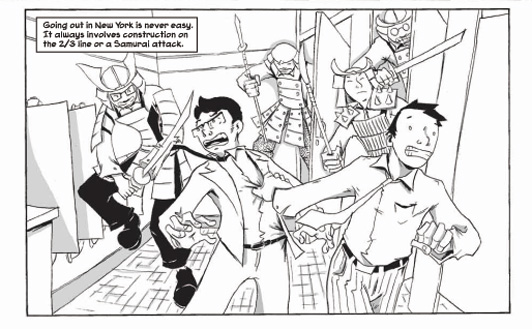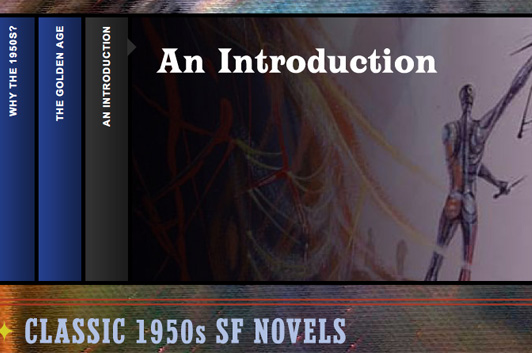Read This: Johnny Hiro

Fred Chao
I’ve been on a low ebb with my comics reading lately, but when a copy of Tor’s collection of the first three issues of Fred Chao‘s Johnny Hiro turned up recently, I flipped through the opening pages, and I was immediately hooked by Johnny’s fight against the giant lizard monster that came all the way over from Japan to smash the wall of his apartment and kidnap his girlfriend Mayumi. Things get even more delightfully weird from there: The panel I’ve sampled above is from a story where Johnny and Mayumi go to the Metropolitan Opera and run into somebody they knew back in Japan… and his enemies… Then there’s the big finale, an extended parody of the sitcom Night Court with Judge Judy replacing Harry Anderson—which even has a callback to Mayor Bloomberg’s involvement in the giant lizard monster saga.
I love Chao’s simple, straightforward line style, and his visual pacing is superb; so many gags in the script get an extra jolt from his ability to know just how much artwork to give them. His celebrity characters are almost never just walk-ons, but actually serve to drive the story forward; there’s a sequence where Grand Puba, who just happens to be a good friend of Johnny’s, is telling a story about the time he and LL Cool J ran into David Byrne, that winds up punctuating an emotional point absolutely vital to Johnny’s development at that point in the series. Even things that initially bugged me early into Chao’s storyline—specifically, Mayumi’s broken English—become essential components of a deeply thoughtful exploration of a young couple trying to find their bearings. I’m keeping an eye out for the next volume, and Fred Chao is totally high up on the short list of my dream illustrators for future ebook projects and Twitter avatars.
1 August 2012 | read this |
Read This: American Science Fiction

Library of America
People are always talking about having been born so many years too soon or too many years too late, but I think that when it comes to science fiction fandom, I was born at just the right time. As a teenager in the 1980s, I only had about a half-century of reading to catch up on, give or take—yes, yes, plus a few major precursors—and I had a well-stocked public library, a speedy reading eye, and plenty of free time. The early boom years of SF were still close enough that much of that material was still in print, so what my library didn’t have, I could track down and buy. So I did a reasonably decent job of staying up to date with “the good stuff” that decade, at least as far as hard SF was concerned, but I was also able to make a pretty good dent in the 1950s and 1960s, too. Although there were gaps…
That’s one of the reasons I’m excited about the arrival of American Science Fiction: Nine Classic SF Novels of the 1950s, a new boxed set from the Library of America. I’m finally going to get to read Fritz Leiber’s The Big Time! Plus, I suspect I’m going to understand Theodore Sturgeon’s More Than Human a lot better than I did when I was 15. (I’ve already started in on The Space Merchants by Frederick Pohl and C.M. Kornbluth, which is a bit funnier with Mad Men-colored retrospective, but I do remember finding it pretty funny—finding a lot of Kornbluth funny, for that matter—in high school.)
As with any attempt to do a “big picture” sampling like this collection, I’ve got a few items left on my wish list, The Languages of Pao by Jack Vance chief among them. Oh, okay, I’ve got a soft spot for Fredric Brown’s Martians, Go Home, too. And though I’m not too frustrated by its absence, I know a lot of other SF fans will mark the omission of Walter Miller, Jr.’s A Canticle for Leibowitz—actually, there seems to be some question about that. The Library of America’s 1950s timeline puts the publication of Canticle at October 1959, while Wikipedia says it was published in 1960 (but with a 1959 copyright). So maybe it’ll be in the 1960s batch!
Wait, you’d probably like to hear more about that timeline, right? It’s part of an elaborate website the Library of America has created as a sort of critical apparatus to go with the books. So you get not just, for example, William Gibson talking about Alfred Bester’s The Stars My Destination or Neil Gaiman discussing The Big Time, you also get an autobiographical essay by Bester and an introductory essay from Leiber plus five additional short stories set in his “Change War” series. And a bunch of other stuff besides. As supplementary websites go, this is pretty sweet.
24 July 2012 | read this |

 Our Endless and Proper Work is my new book with Belt Publishing about starting (and sticking to) a productive writing practice.
Our Endless and Proper Work is my new book with Belt Publishing about starting (and sticking to) a productive writing practice. 
